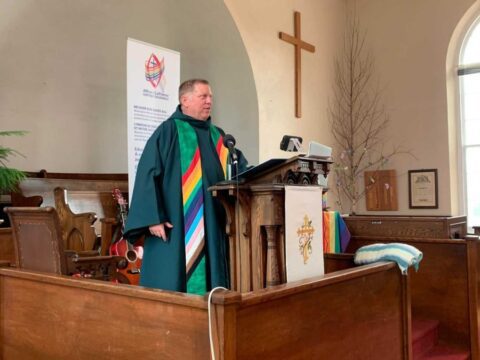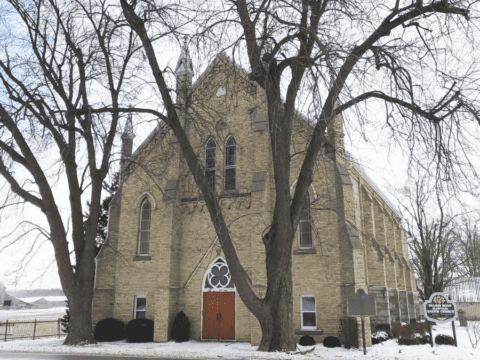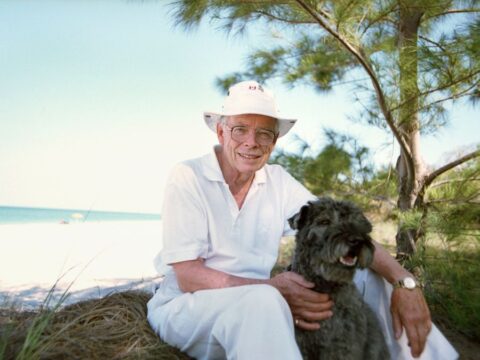An offhand remark quickly called out as offensive by commissioners marred a virtual United Church General Council session on May 11. The remark, which complained of “pagan worship” and “pagan leaders” in the United Church, came during an information-sharing event about a proposal focused on the restructuring of the Indigenous church.
“Pagan worship appears to be the theological thrust of the conversation,” the person, who was not a commissioner or invited guest, said. “That’s why we are getting pagan leaders from the Caribbean and west Africa.” The comment was made using Zoom’s chat feature.
You may unsubscribe from any of our newsletters at any time.
Rev. Deb Anderson-Pratt, a Cree/Saulteaux minister from Regina Native Outreach Ministry in Regina, condemned the statement. “Our ways were referred to that when colonization came to us — as pagan, as heathen. I thought we were way beyond that kind of conversation within the church,” she said. “That is very offensive to our [Indigenous] people,” she added, “And I think the person who commented needs to pray for herself, and we need to pray for her.
Commissioner and former moderator Very Rev. Jordan Cantwell also unequivocally denounced the comment. “It’s something we need to challenge in ourselves when we hear that in our own hearts,” she said during the session.
Cantwell suggested that the comment reveals why the proposal on the restructuring of the Indigenous church needs to be taken seriously during the decision-making sessions of General Council, to be held from July 21 to 25 via an online platform. The proposal, which the National Indigenous Council brought forward, recommends that the General Secretary “identify and remove all structural barriers” to a self-determining Indigenous church within The United Church of Canada.
“What I hear the Indigenous church asking…is that we allow [Indigenous] folks to be United Church in the way that is authentic for them, and that we embrace one another as relatives in the church,” Cantwell said.
During a presentation on the proposal, Rev. Murray Pruden, executive minister for Indigenous ministries and justice, said that the Indigenous church is currently represented in a regional capacity within the United Church governance model. “But what we are trying to achieve — a nation-to-nation relationship — is different than that. We have had shackles on our wrists as the Indigenous church.”
“How do we clear the way so that the Indigenous part of The United Church of Canada, through the National Indigenous Council, can create that space they wish to create with the system that we’ve got?”
Attendees overwhelmingly expressed support for the proposal. “I don’t think I have a say or an opinion in the Indigenous church journey,” said commissioner Rev. Allan Gairns, minister at Rosetown United in Rosetown, Sask., using the chat function. “I hope that while the Indigenous church is working out their identity and vision they feel welcome to do this within The United Church of Canada.”
Current moderator Rt. Rev. Richard Bott clarified that the proposed changes to create a more equitable church structure will require a remit process — essentially, a motion and vote of approval to make a change to the church constitution as part of the decision-making session.
Another proposal, called Living into Reconciliation, recommends that the General Council approve a remit that would “give pre-emptive approval for what the Indigenous Church determines as its place in the United Church.” This proposed change would prevent the need for the Indigenous church to seek further remit approval — a process that has been criticized for its “colonial feel.”
More on Broadview:
- Expletive-laden remark shocks attendees at General Council meeting
- New initiative helps First Nations identify unmarked graves
- Indigenous United Church leaders on Pope Francis’s apology
“We actually have to follow settler process,” Bott said. “That’s part of the difficulty that we’re struggling with… How do we clear the way so that the Indigenous part of The United Church of Canada, through the National Indigenous Council, can create that space they wish to create with the system that we’ve got?”
While some commissioners interpreted the proposal on the restructuring of the Indigenous church as meaning that it wants to separate from The United Church of Canada, members of the National Indigenous Council reassured them that the Indigenous church would continue to work in partnership with The United Church of Canada.
Commissioners also condemned the comment via the chat function, with some seeing it as a sign of racism in the church. “I found the comment very offensive, but I also know that within me lives much of that same attitude,” said Cantwell. “I want to encourage all of us, when we encounter that in ourselves, to question it, to dig under it and to root it out because it leads to hurt and harm and racism and oppression.”
This is not the first incident of this kind to occur at this year’s unprecedented online Council. On April 6, a commissioner anonymously uttered obscenities after a Jewish interfaith guest had spoken.
***
Julie McGonegal is an associate editor at Broadview.














I am sorry to read of such comments at this time I had thought we had moved beyond this.
We all need prayer to understand and forgive and help educate better.
We are still far too colonial in my books and have much to do and change within ourselves.
That is why we all need prayer. Both those who think this way and those who don’t.
May we change within the love God has for us all.
Learning, adopting, and using a trauma-informed model as a reference point in discussion and actions can help. By using it, people develop awareness and avoid participating in patterns of behaviour that generate or perpetuate trauma. It can also give a reference point to understand those events and talk about them so we can do less of that going forward. For my Trauma Informed Ministry primer I adapted the six-principle trauma-informed model of the CDC as it included a principle I present as “Awareness of and Sensitivity to Identifiable Trauma-Impacted Groups Within Society. People responding know that specific groups in society experience persecution, violence, harassment, alienation, disenfranchisement, health problems, bullying, social disadvantages and discrimination of other kinds—and are attentive to those with known vulnerability for sustaining traumatic impact.” In other words, the model asks people to respond to those who may be in a trauma impacted group so that more harm is avoided. Yes, people have to be more careful, more aware of their words and actions, embracing humility in order to have a conversation that will change people and the assumptions they might have. People will make mistakes. It’s a learning curve. But reckless and emboldened ignorance that harms can be avoided. In education, law enforcement, non-profit work, emergency response, disaster response, health care and more, Trauma Informed Models are being used. Ministry, also, is marinating in trauma and our institutions and personal default settings are still infected with what perpetuates that. Let’s keep working to align our responses, processes, participate and leadership to the gospel we profess, giving thanks for grace received from so many identifiable trauma impacted groups in The United Church of Canada.
Although I find the original remark abrupt (and needs serious revision), there is some truth to it.
The United Church of Canada no longer sees its mandate through the eyes of the Methodist and Presbyterian church in the late 1800’s.
The mandate of the Church was (still is) to preach Christ, following the command of Matthew 28:19-20.
This has been long given up in the United Church.
If the “Indigenous” people find the original mandate offensive, good, this means God’s Word is true. 1 Peter 2:1-8.
Are Christians perfect? By no means or else Peter would not have finished the thought in chapter 2 verses 11-12. This is also why the new trend is to see the Gospel as a weapon for colonialism and the “white” movement. (Which is a lie from Satan).
I would think it honourable that the Methodist/United church and its original intent was to provide “Good News” to those who would heed it. Unfortunately, through sin, this intent was marred.
What I see now is the opposite of the original intent, it is not the United Church reaching the “Indigenous”, but the “Indigenous” mandating the direction of their view of the Gospel.
I would think it best for the church to allow the separation of those who are not in the best interest of the church and its mandate from Christ.
The Church is so far away from Christ, it no longer knows Him.
A story like this helps reinforce my admiration for the United Church; an admiration which was marred by several events over the past number of years that I won’t care to mention. I hope we are at the point where we recognize that different cultures have their unique views on spirituality and relationship with God and with one another. To me, Jesus Christ is an archetype human in a loving relationship with God. Other folks have their opinions but as we look at the pictures of space, and the galaxies and stars and realize that planet Earth is so microscopically tiny in the grand view of things, how can we possibly believe some of the things that ancient societies once believed? I welcome all people who have their uplifting and life-giving idea of and relationship with God.
We are changing. We must evolve. This story is uplifting and I hope the United Church hierarchy will recognize that the essence of ministry is love, caring, compassion, leadership, understanding and drawing people together rather than engaging in separation and having a tiny view of God and how we are to think of God.
You are one of quite a few who proves my point above.
The Church is so far away from Christ, it no longer knows Him.
Want to know God? Look at Christ, He is God. (At least you somewhat admit Christ was real)
Christian faith is not a matter of opinion, it is a way of life.
It is so unlike other religions that it claims to be the only way.
Your observation of space and time proves the verse, “What is man that you are mindful of him; and the son of man that you care for him?”
Who’s god can one have a relationship with? Certainly none other than the Christian God.
To each his own thought and interpretation. Seminary teaches us to think critically…..until our critical thought conflicts with the accepted mindset. What matters is how we live our lives. By our actions we are known. We each have our different views and that’s OK. I choose to try and live according to the story that I read about an ideal human in a loving relationship with God. And, I choose not to force my personal belief on anyone.